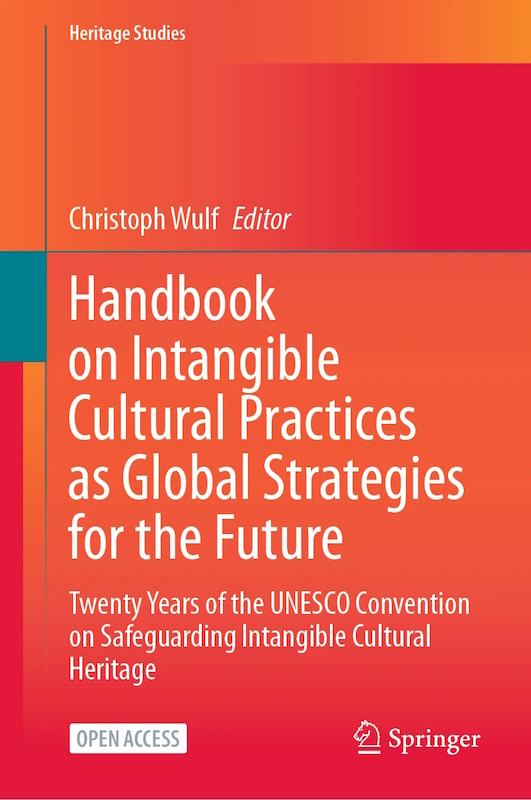
Twenty Years of the UNESCO Convention on Safeguarding Intangible Cultural Heritage
Dieses Buch zum 20 jährigen Bestehen der Konvention zum immateriellen Erbe ist mit 45 Autoren und Autorinnen aus mehr als 20 Ländern Ländern ein neues Highlight in unserer Reihe Heritage Studies und als Open Access Buch abrufbar.
Christoph Wulf
Über dieses Buch
Dieses Open-Access-Handbuch ist das erste, das eine Bestandsaufnahme und einen umfassenden internationalen und interdisziplinären Überblick über die Entwicklungen in der lebendigen Kultur seit Beginn der Konvention zum Schutz des immateriellen Kulturerbes im Jahr 2003 präsentiert. Es basiert auf einem erweiterten Kulturbegriff, wie er seit den 1980er Jahren von der UNESCO und von mehr als 180 Ländern verwendet wird. Die Konvention verdeutlicht die bedeutende Rolle des globalen Südens bei der Sensibilisierung des Planeten für die Bedeutung immaterieller kultureller Praktiken als konstituierende Bestandteile kultureller Identität. Da in den kommenden Jahrzehnten immaterielle kulturelle Praktiken für eine nachhaltige und friedliche planetarische Kommunikation immer wichtiger werden, wird dieses Buch einen wesentlichen Beitrag zu diesen Entwicklungen leisten.
Keywords: living heritage, intangible cultural practice, safeguarding intangible cultural heritage, identity building through intangible cultural heritage, aesthetics and intangible cultural heritage, digital and post-digital culture and ICH, mimetic learning in intangible cultural practices, practical knowledge and intangible cultural heritage, resilience through intangible cultural practices, performativity of intangible cultural practices, participation in intangible cultural practices, global citizenship through intangible cultural practices, intangible cultural practices as strategies for the future, Anthropocene and practices of intangible cultural heritage, education through intangible cultural practices, community building through intangible cultural practices, human rights through intangible cultural practices
Table of contents
Introduction
Christoph Wulf, Living Cultures in the Anthropocene. Taking Stock of Initiatives across the World
I Living Heritage as Initiator of Transition
Susanne Schnüttgen, Living Heritage – A Contribution from UNESCO
Pier Luigi Petrillo, Living Heritage as a Global Public Good and Sustainable Development
Marlen Meissner, Giving a Voice to the People: Intangible Cultural Heritage in Transformation and Structural Change
Marie -Theres Albert, World Heritage and Intangible Heritage – What Connects it and what Differentiates it?
Thomas Schmitt, UNESCO’s World Heritage Convention, the Intangible Heritage Convention and the Masterpiece Programme. An Analysis of Mutual Relations, References and Distinctions
II Colonialism, Minorities, Inequalities, and the Struggle for Human Rights
Michael Omolewa, Emmanuel Orihentare Eregare & Rose Eyefujinrin Ebohon,
Africa’s Response to Intangible Cultural Heritage Convention
Nina Graeff, Notes Nobody Notes: Samba as Musical Heritage of African Ancestry in Brazil
Michelle L. Stefano, Threats and Approaches in Safeguarding of Intangible Cultural Heritage. A View from the United States
Lydia Kieven & Christoph Antweiler, Controversial Intangible Heritage in Indonesia
Kristin Kuutma & Elo-Hanna Seljamaa, Intangible Heritage and the Complexities of Inequalities in the Politics of Belonging
Eva Kuminková, L’ubica Vol’anská & Martin Andrade Perez, On Reaching a Consensus: A Paradigm for the Inscription of Elements on the UNESCO Lists of Intangible Cultural Heritage
III Identity Building, Participation, and Conflicts
Hanna Schreiber, Twenty Years of the UNESCO 2003 Convention for the Safeguarding of the Intangible Cultural Heritage: Experiences from the Implementation of the Convention in Poland (2011-2023)
Stefan Koslowski & Julien Vuilleumier, Valleys Low, Mountains High. Embedding the 2003 Convention in Switzerland
Benjamin Hanke, Expanding Cultural Participation through the 2003 UNESCO Convention in Germany’s Multi-Level Governance System
Sophie Elpers, Making Sense – and Talking about Smell. Dynamics of the Implementation of the 2003 Convention in the Netherlands
Hahm, Hanhee & Yong Gu Kim, An Examination of the Developmental Process and Characteristics of the Korean Intangible Cultural Heritage Protection System
Anying Chen, The Special Way of Intangible Cultural Heritage Safeguarding in China and Some New Practice and Concepts
Viviana Polo-Flórez, What Contribution do Intangible Cultural Heritage Practices make to Identity? Global, Regional, National, and Local Perspectives. A Colombian Case Study
Hani Hayajneh, Against All Odds: Keeping Intangible Cultural Heritage in the Arab World Vivant
IV Living Culture in Aesthetic Encounters
Tiago de Oliveira Pinto, Music as Heritage
Vicky Kämpfe, Modern Dance Created in Germany. The Safeguarding and Creative Practice of Dance Heritage
Christoph Wulf, Intangible Cultural Heritage: Challenges and Expectations
Hartwig Lüdtke, Museums as Facilitators in the Safeguarding of Intangible Cultural Heritage
Julius Heinicke, The Glocal Self: Cultural Policy Concepts between Heritage and Future Using the Example of Berlin’s Humboldt Forum
Sharmistha Saha, From Communities of Belief to Artists in Performance: ‘Clear Enigma’ of Odin Teatret and the Pulluvas, or Three Transitions in Heritage
V Challenging Issues, Future Developments, and New Areas of Research
Gertraud Koch, Julia Rausch & Anna Stoffregen, Cultural Economies of Intangible Cultural Heritage as Modalities of Care. The Wealth of Networks, Community-Based Value Chains and Commoning
Benjamin Jörissen & Leopold Klepacki, Deeply Entangled, Never Alone: Intangible Cultural Heritage Practices in Post-Digital and Digital Culture
Suzanne Ogge, Threats to the Transmission of Living Heritage among Children and Youth. Social Media Use, Reflections and Suggestions from a decade of Capacity-building
Payal Arora, Metaphors for the Study of Digital Heritage Cultures
Cristina Amescua-Chávez & Montserrat Patricia Rebollo Cruz, Anthropology as a Catalyst in Living Heritage World-Making Projects: The Case of the Voladores Ceremony in Mexico
Manuel Trummer & Mirko Uhlig, Intangible Heritage as a Factor of Cultural Resilience in Rural Areas of Germany
Tomo Ishimura, Restoration of Intangible Cultural Heritage and Communities after Disasters: Cases of “Soma Nomaoi” and “Obori Soma Yaki” in Fukushima Prefecture, Japan
Editor and Affiliation
Christoph Wulf, Anthropologie und Erziehung, Freie Universität Berlin, Berlin, Germany
About the editor
Christoph Wulf, PhD, is Professor of Anthropology and Education, member of the Interdisciplinary Center for Historical Anthropology, the Research Training Group "Body Stagings (1997- 2006), the Collaborative Research Center "Cultures of the Performative" (1999-2010), the Cluster of Excellence "Languages of Emotion" (2007-2014) and the Research Training Group "InterArts Studies" (2006-2015) at Freie Universität Berlin. His books have been translated into twenty languages. He was founding secretary of the "Education Commission" of the "International Peace Research Association", president of the "Network Educational Science Amsterdam", initiator and chairman of the Commission on Pedagogical Anthropology of the German Society for Educational Science. He is vice president of the German UNESCO Commission. Visiting professorships and research stays in, among others: Stanford, Paris, Rome; Lisbon; Vienna, Basel, Stockholm, Amsterdam, London, Tokyo, Kyoto, Mysore, New Delhi, Beijing, Shanghai, Saint Petersburg, Moscow, Kazan; Sao Paulo. Main research interests: Historical-cultural anthropology, pedagogical anthropology, aesthetic and intercultural education, performativity and ritual research, diversity and emotion research, mimesis and imagination research; cultural education; Anthropocene research.
Bibliographic Information
Book Title: Handbook on Intangible Cultural Practices as Global Strategies for the Future/n
Book Subtitle: Twenty Years of the UNESCO Convention on Safeguarding Intangible Cultural Heritage
Editor: Christoph Wulf
Series Title: Heritage Studies
Publisher: Springer Cham
Copyright Information The Editor(s) (if applicable) and The Author(s) 2025
Hardcover ISBN978-3-031-72122-9 Due: 27 December 2024
Softcover ISBN978-3-031-72125-0Due: 27 December 2025
eBook ISBN978-3-031-72123-6Due: 27 December 2024
Series ISSN 2946-6059
